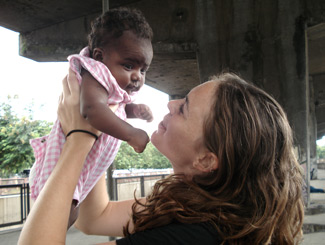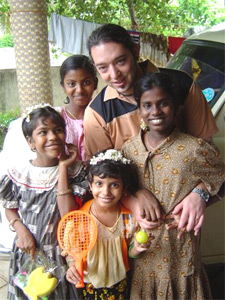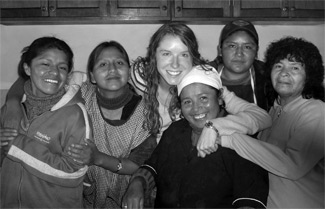|
|
A Call to Justice: Reducing Poverty through Obedience
“There must, then, be no poor among you.” At least that’s what God told the Israelites in Deuteronomy 15:4. Sounds pretty authoritative—I mean, it’s hard to read this as a suggestion or even a good idea which God is trying to convince his people of. Thankfully, this responsibility is given to the community of God’s people rather than to one isolated individual. Further, not only does the community share this opportunity to obey, but in the second part of verse 4, God makes provision for everyone (the poor and non-poor alike) by promising his blessing. The promise of blessing is the subsequent sign that God’s people have been loving and faithful in their obedience. This points to the reciprocity of God providing for the poor through his provision for the community.
However, if you follow the thread through the rest of Deuteronomy 15, the ultimatum of poverty reduction seems to break down. In fact, verse 7 starts by stating, “If anyone is poor…” (emphasis mine). This suggestion that there might be poverty does not yet reference a total breakdown of God’s ideal—it allows God to offer the grace of a contingency, reminding his people that if there are poor people, not to be “hardhearted toward them.”
Surprisingly, we read that God’s ideal moves from a command to a contingency to a collapse. In verse 11, we read of the present and tragic disobedience of his people by the presence of poverty: “There will always be poor people in the land.” The presence of the poor points to the direct correlation that poverty is an indictment of sin, the disobedience to God’s ideal as commanded in verse 4. In the rest of verse 11, God institutes a secondary statute in light of disobedience: “Therefore, I command you to be openhanded toward those of your people who are poor and needy” (emphasis added).
Often when discussing this command-contingency-collapse-command continuum, people try to distance themselves from their responsibility for the poor. Sometimes people reference Matthew 26:11 where Jesus himself says, “The poor you will always have with you,” as if to suggest Jesus was giving up on fighting poverty and, therefore, absolving us of the same fight. Those who use this passage as an exemption from fighting poverty have unknowingly (at least apparently) lost the context on which nearly all Bible scholars agree: Jesus was not cowering from a social problem; he was reminding us of the command in Deuteronomy 15:11.
A Call to Imagination: Not Reducing the Poor to Their Poverty
Today, in a highly stratified, over-categorized, globalized world, Christians have yet to take significant steps in reducing poverty. Christians have, however, taken great strides in reducing the victims of our disobedience to those we refer to as “the poor.” This reductionist mentality comes with loaded assumptions and accusations of those suffering in contexts of oppression, exploitation and extreme poverty. It is perpetuated by our language as a means of further distancing ourselves from our complicity in their poverty.
![]() The power of naming is also a tool used in society to control the victims of poverty. We use terms to label the victims of poverty that only contribute to their powerlessness. Even by labeling victims of poverty as “the poor,” we have done our friends (and ourselves) a terrible disservice. We have built social walls that divided “us” from “them”; we have ascribed labels that disconnect us from any responsibility we may have in perpetuating situations of poverty, and we have ascribed derogatory terms that describe a situation, not the person. Terms and names such as beggars, street kids, squatters, bums, rag-pickers and hookers have become tools that further the dehumanizing process of marginalization. These terms focus on the environment of a person over his or her identity and the social standing of a person over his or her dignity.
The power of naming is also a tool used in society to control the victims of poverty. We use terms to label the victims of poverty that only contribute to their powerlessness. Even by labeling victims of poverty as “the poor,” we have done our friends (and ourselves) a terrible disservice. We have built social walls that divided “us” from “them”; we have ascribed labels that disconnect us from any responsibility we may have in perpetuating situations of poverty, and we have ascribed derogatory terms that describe a situation, not the person. Terms and names such as beggars, street kids, squatters, bums, rag-pickers and hookers have become tools that further the dehumanizing process of marginalization. These terms focus on the environment of a person over his or her identity and the social standing of a person over his or her dignity.
Scripture has much to say about the power of naming.
- In the Psalms, we discover a theology of significance in a passage in which God reveals that he knew us before we were born (Psalm 139:13-16).
- In Genesis, a theology of dignity is detailed through the creation of humanity in God’s image (Genesis 1:26-27).
- In Isaiah, we read that the theology of dignity is based in grace when we learn that God has inscribed us on the palms of his hands (Isaiah 49:16).
- These theological inferences to dignity are all precursors to the ultimate theology of God’s redemption. In Matthew, Jesus renames Simon, illustrating his theology of redemption. Simon becoming Peter was more than a mere renaming of a man; it was the reclaiming of his humanity so that God could be glorified in it.
Today, however, humanity (along with significance, identity, dignity and grace) is stolen in the grip of poverty and is renamed.
|
|
It is not coincidental that the only character named in any of Christ’s parables was Lazarus, the man found begging and sleeping on the street in front of a rich man’s home (Luke 16:19-31). In the world’s telling of that story, the rich man would have been named and the one begging would have remained part of the backdrop of the narrative. But God’s kingdom reverses contemporary social norms in such a way that the reversal is a renewal that sets things right. By naming only Lazarus in all of his parables, Christ challenges and reclaims the world’s power of naming, a naming that has been used to defame. His disregard for our labels and his renaming of the victims of poverty redeem the poor whom he has chosen to inherit his kingdom (James 2:5-6). How easy it is to exploit the nameless.
How easy it is to justify our unresponsiveness to those we see only as statistics. Our perceptions of reality have been insulated and isolated by the way we read reality. As long as society and the Church continue to steal significance, identity, dignity, grace and the potential of redemption from the oppressed, then God’s image and character will continue to be under assault.
The community I am a part of has taken this on as a challenge: to rename those the world (and even the Church) has forgotten. The name of poverty is oppression; the name of the poor is chosen. ![]()
A Call to Relationship: Moving From Donor to Receptor in Mission
My community, Word Made Flesh, lives among the suffering and oppressed. Although we are young people, it routinely seems we go to more funerals than weddings, visit more gravesites than delivery rooms. It is not uncommon for our friends to fall because of AIDS, police violence, street fights or domestic abuse. We live in a world that cries out for justice—a world that needs God's kingdom to come.
We are a community of 250 board members, staff and interns who have given ourselves to serving Jesus among the poorest of the poor. We have sought to fuse ministry and spirituality in such a way that our commitment to justice is an extension of our relationship with Christ. With communities in Argentina, Bolivia, Brazil, India, Nepal, Peru, Romania and Sierra Leone, we marvel at the movement God has allowed this to become.
|
|
We have been called to give ourselves in selfless service among the poor. We have fallen so deeply in love with Jesus that our love compels us to love him in the world.
To find us, you might need to search the trash heaps behind local businesses in GalaÌÉå£i, Romania, where our staff go to find the children who have nowhere else to sleep; you might need to stumble down the streets of some of Asia's most notorious red-light districts where our community goes to visit women and children enslaved in the commercial sex industry; you might need to brave the darkest corners of South America's worst neighborhoods, the places where homeless youth smoke their paint or glue bags to forget their hunger and fear.
For most evangelical Christians, ministry with the poor lacks intimate relationships because of their disregard for the intrinsic dignity of people who are poor. This view causes programs and projects for the poor to lead to a subtle, paternalistic dehumanization of the poor. As Christians, we need to move away from the place where our attempts at compassionate ministries degrade poor people by turning them into beneficiaries, and we must embrace poor persons in relationships that affirm their identity and dignity. The poor must not continue to be the objects and recipients of our good works and good deeds; they must instead be included in our lives as active participants who receive our respect and honor.
Scripture is clear. Our righteousness is qualified and validated in our relationships with the poor (Proverbs 19:17, 21:13, 22:9, 29:7; Isaiah 28:17; Jeremiah 22:16; 1 John 3:16-18) as the Lord uses the poor as a standard for judgment (Matthew 25:31-46). Jesus must remain at the center of our community. As he identifies himself with the poor, we must place the poor at the center of our communities, allowing them to be in influential positions that speak into the identity and direction of our churches and ministries.
I am invariably struck by scripture alluding to the conclusion that the integrity of our Christian virtue is defined in relationships with the poor. Even the basis of our intimacy with the Lord is cradled in how our intimacy with the poor is expressed in our social lives: “‘He defended the cause of the poor and needy so all went well. Is that not what it means to know me?’ declares the Lord” (Jeremiah 22:16). ![]()
When we allow scripture and Christ’s example to penetrate our hearts and minds, we can do no less than commit to relationships. We realize that people rather than programs must be central to all that we do, and the poor are human persons like ourselves, with names, stories to tell and lives to share.
A Call to Submission: Following Our Friends to God’s Heart
We have a friend named Tuna. He sleeps on the street outside the Government Art College in Kolkata, India. With his blanket, change of clothes and other personal belongings, he weighs ninety-six pounds. Tuna looks like he could be forty-five years old, but in fact he is only twenty-six. His clothes are dirty, his hair is full of lice and his belly is full of worms. Tuna has tuberculosis. If you saw him on the street, you might give him some change, but most of us wouldn’t give him the time of day.
Our community first met Tuna in 1995, but it was not until a few years later that we really started to get to know him. People who live and work in the area where Tuna spends his time have filled in some of the mysterious gaps about Tuna’s past. They say that Tuna was a very talented and successful art student until something terrible happened to his brother. Whatever that crisis was, it was so traumatic that Tuna broke under the burden of it and went to the streets. He has never been the same, and it seems very unlikely that he will ever be the same again. His life is all but destroyed.
Over many meals, we have sat with Tuna and tried to get him to talk about himself. After several years, it seemed he began to recall things from his “old life.” He said that he had three brothers and sisters. His last name was Pal (a typical Bengali name). He seemed to want to remember more, but there was something that wouldn’t let him.
Tuna was a Shiva-devotee (in Hinduism, Shiva is referred to as “the Destroyer”). Every time we sat down to eat, he would say his prayers to Shiva and make a small offering to the god by setting part of his meal aside as his gift. It was sadly ironic to see this man whose life is destroyed worshipping “the Destroyer.”
In our efforts and prayers to help liberate Tuna from his physical, emotional and spiritual poverty, we have found ourselves being liberated by his presence in our lives.
On one occasion, we were sharing lunch together when he began to go through his ritual offering to Shiva. One of our community members suggested, “Pray to Jesus, Tuna.” He replied, “I only pray to Jesus now.”
As Tuna continues to learn how to pray to Jesus, he also teaches us how to learn. Being friends with him has allowed us to move from a mentality of programmed ministry to one of relationship. For so long, our mentality has been one of ministering to the poor as objects and recipients of compassion and charity. But Tuna has reminded us of our need to include the poor in life through intimate relationships—to see the poor not as those we “minister to,” but as those whom we identify ourselves with. He reminded us to open ourselves up to be ministered to by the poor.
Being in relationship with Tuna has allowed us to move from donor to receptor. When we view him as a person with intrinsic dignity that points to his proper identity, we can receive so much from him. In our efforts and prayers to help liberate Tuna from his physical, emotional and spiritual poverty, we have found ourselves being liberated by his presence in our lives. Although we may have hoped to give to Tuna, he always seemed to give more.
We must remember to be intentional and focused on authentic relationships based on love for our suffering friends as Jesus is for us. When our acts of generosity and kindness first spring out of a desire to love humbly, sincerely and courageously, a new and intimate relationship is able to be found that births hope and transformation for the greater good of all humanity.




